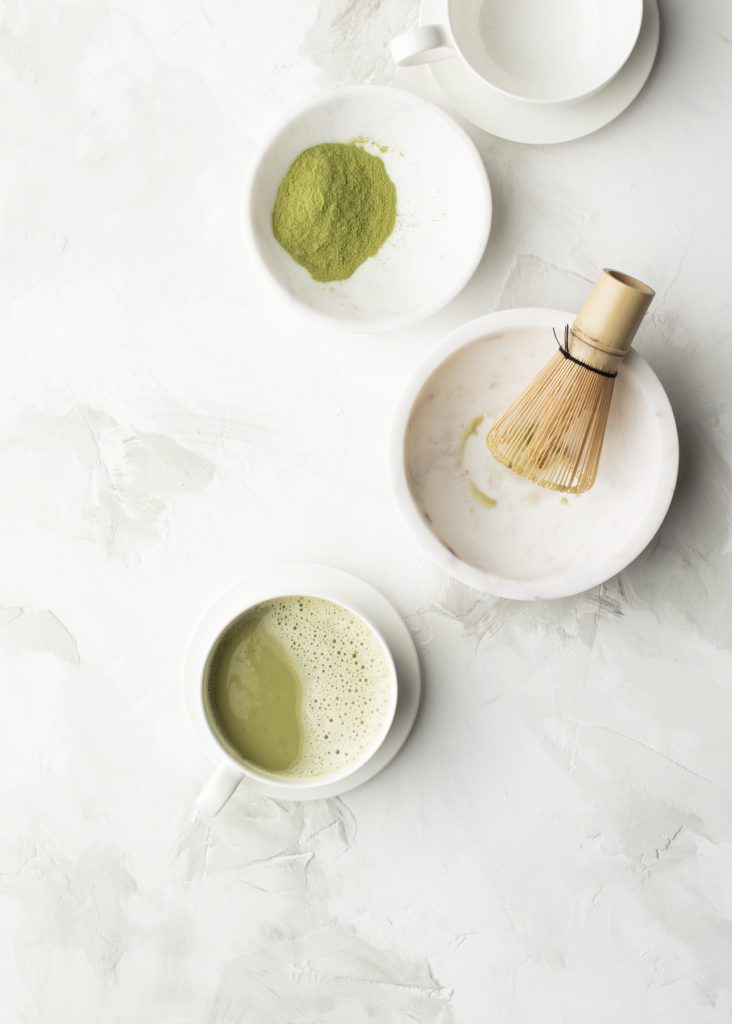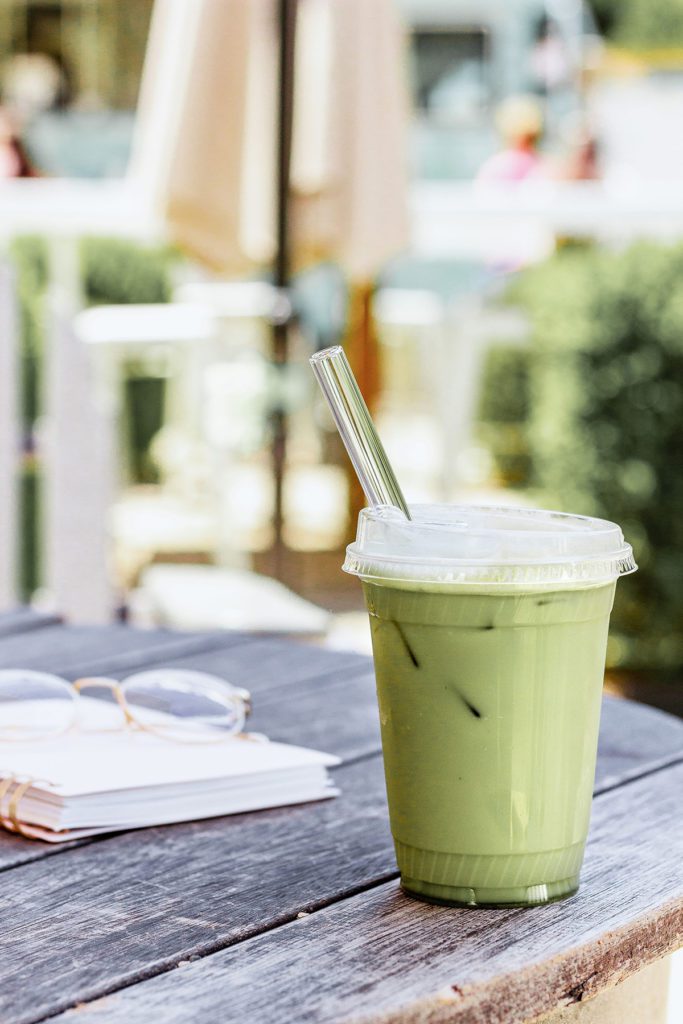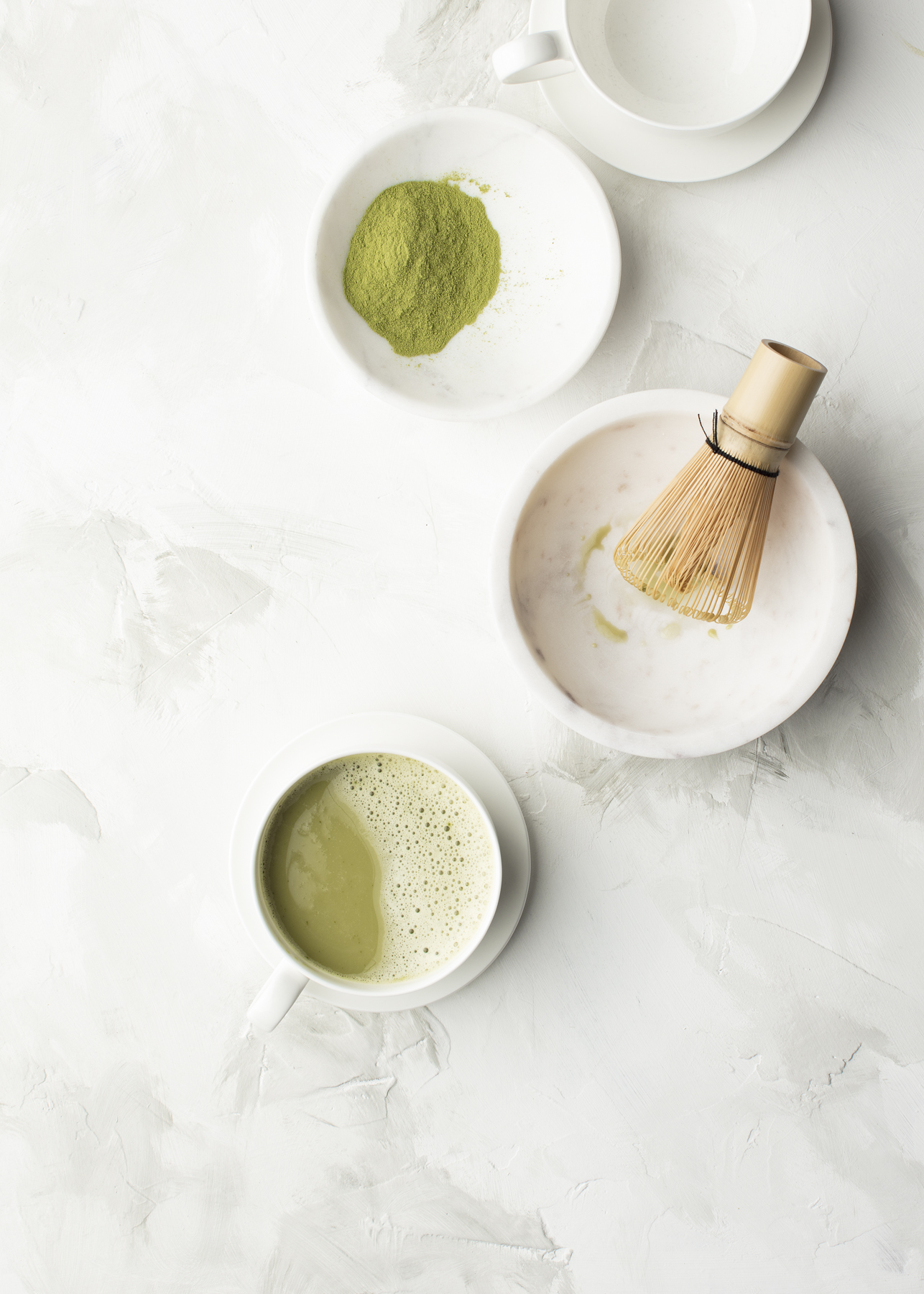
I love to have a matcha latte after lunch. It’s a great alternative to coffee with many health benefits. This recipe is delicious, creamy and vegan. Enjoy.
What is matcha?
Matcha is a green tea powder high in antioxidants. It contains caffeine so it has a stimulating effect (which can help alertness) but it also contains L-Theanine (an amino acid) which slows the release of caffeine and has a calming effect so doesn’t tend to create the jittery-ness that coffee can.
Matcha lattes are a good way to get the benefits of green tea in a more filling and sumptuous way.

How is Matcha different to green tea? 🌿
Matcha is made from green tea leaves, which are finely ground into the powder.
Matcha differs from other green teas in two main aspects of how it is farmed and processed:
🌱 The green tea plants for Matcha are ‘shade-grown’ for 3-4 weeks before harvest: farmers cover the plants for around 30 days before harvest to avoid direct sunlight, this increases Matcha’s chlorophyll and amino acid content.
🌱 The stems and veins of the leaves are removed before processing: this allows the entire leaf to be made into a fine powder, using the whole leaf also boosts the antioxidant load and caffeine content.
5 Health Benefits of Matcha 🌱
Matcha is renowned for its antioxidant properties and ability to cleanse the body of toxins. Not only is it good for your physical health but it also helps to instil mental clarity and boost mental performance. Here are just some of the amazing benefits of drinking Matcha green tea.
1. Matcha is a Powerful Antioxidant
Antioxidants fight against oxidation in the body, helping to protect us from free radicals before they can cause cell damage – often the root cause of disease. Antioxidants are found in many plant-based foods but matcha is considered to be one of the most potent antioxidants in the world. It is extremely rich in flavonoids named catechins, which are particularly potent thanks to the geographic area Matcha is grown in, as well as how it is grown and harvested. This is what sets Matcha apart from other green teas.
In the long-term, drinking matcha tea can help to bolster the immune system and protect against more serious chronic diseases.
2. Matcha Helps to Detoxify
Drinking Matcha has been shown to have a protective effect on the organs involved in detoxification. Green tea intake has been found to help prevent damage to the liver and kidneys, which are essential for flushing out toxins.
Not only does this help to protect the liver and kidneys from damage and disease, but it also helps them work more efficiently. So, by supporting these organs Matcha can help with overall detoxification, helping to minimise damage from environmental toxins common in the modern world, like air and water pollutants e.g. heavy metals which end up in the food chain.
Supporting your natural detox mechanisms is also important to enhance immune function.
3. Matcha Boosts Brain Function
Renowned for its ability to increase focus and concentration, many studies have shown that drinking Matcha can enhance brain function. Studies have shown that Matcha can help to improve attention, reaction time, concentration and memory.
Many of Matcha’s brain-boosting benefits are linked with it’s high caffeine content, providing around 70mg caffeine per teaspoon – compared with 28mg found in regular green tea and 63mg you’d get with a shot of espresso.
Caffeine is a known brain stimulant which helps to increase brain processing speed and improve cognitive function. It also works to fight against a chemical called adenosine, which reduces neurotransmitter function and has a negative effect on brain function.
Interestingly, Matcha also contains a compound called L-Theanine which influences the uptake of caffeine in the brain, promoting alertness over a longer period of time and helping to avoid the post-caffeine crash!
4. Matcha Promotes Weight Loss
Green tea is a popular ingredient often found in weight loss supplements, so it makes sense that Matcha would be used for that reason too.
Matcha’s high caffeine content can help to boost endurance and performance during exercise.
Matcha is also thought to be useful for enhancing weight loss by boosting metabolism and increasing fat oxidation.
Even for those who are not trying to lose weight, matcha can be a great addition to your lifestyle to help maintain a healthy weight and enjoy the wider benefits such as lower cholesterol, improved blood pressure and a lower risk of conditions such as heart disease and Type 2 Diabetes.
5. Matcha Helps to Strengthen Bones
Several studies have found that Matcha can help to increase bone mineral density.
Catechin compounds which are in plentiful supply in Matcha help to create “osteoblasts” – cells which form new bone. This is important for fitness and mobility and also helps to reduce the risk of osteoporosis as we age.
How to make a matcha latte:
- Make cashew nut milk by soaking 100g of cashew nuts in water for 10 minutes +
- Drain water and rinse cashews
- Blend cashews with 2 cups of water, 1 date (optional) and some cinnamon (optional).
- Take 1 teaspoon of matcha and blend it with a little bit of hot (not boiling) water. Use a matcha whisk or if you have a milk frother use that!
- Warm half cup of rude health coconut milk and half a cup of your homemade cashew nut milk on the stove, add your matcha powder (that you have made into a liquid).
- Store the rest of your cashew nut milk in an airtight container (I use an old peanut butter jar).
Ingredients
- 100g cashew nuts
- Rude health coconut milk (or alternate plant based milk)
- Ceremonial grade matcha powder
- Optional: 1 date
- Optional: cinnamon powder

Other blogs you might enjoy:
